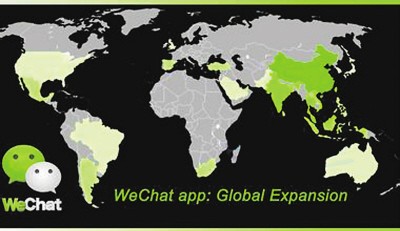 |
| (File Photo) |
As well as your basic necessities, "Made in China" components have penetrated your mobile phone.
Sharing and communicating with your friends on WeChat, customizing your Android home screen into something unique with Go Launcher EX manages app, enjoying the ultimate web surfing experience in U.C. browser, and taking amazing photos with the mobile camera app Camera360… nowadays, you can see such scenes throughout the world, and especially in countries like the United States, Russia, South Africa and India.
And all the above-mentioned apps were created in China. They are changing people’s lives and impacting the world.
According to data from mobile data firm App Annie, two Chinese companies have squeezed into the world’s top ten in the Google App Store download rankings.
“I meet a lot of investors in the United States. When I meet them for the first time and they say to me, “I am a user of your products”, then I can loosen my tie and breathe out. I know that things will go well thanks to their understanding of our products,” says Zhang Xiangdong, President of Sungy Mobile Limited, a Guangzhou-based company that is a leading global provider of mobile Internet products and services.
Sungy Mobile is best-know for its Go launcher EX app, which creates a wide variety of options for Android-based smart phones. Its apps, most of which are free, have achieved a collective 325 million downloads globally - and 70 percent of its users are from outside China.
As well as domestic Internet giants Baidu, Tencent and Kingsoft with an eye for the international market, some small and medium-sized companies are also unearthing their first pots of gold in overseas markets. According to Yu Dejun, Vice President of APP Annie, it is estimated that the revenues of Chinese firms on Google Play rank among the world’s top three.
The Mobile Internet itself is an internationalized market, says Zhang Xiangdong, and a good product can win popularity in a very short time through social networks. It is generally believed that competition in overseas markets is fairer, and this is enticing Chinese-built apps into competition with other world products.
In recent years apps and games such as Evernote, Line, and Angry Birds have entered the Chinese market, allowing domestic developers both to feel the pressure of competition and to see the potential in overseas markets.
Internationalization is our dream, and it is also the only way to compete on the mobile Internet. If a mobile Internet company cannot gain a foothold in the global market, then sooner or later it will lose out to its rivals, according to Zhang. But when going abroad, mobile apps must be ready to localize and to adapt to different cultures and markets, he adds.
Everything depends on product
As well as the Internet giants, small and medium-sized companies are also seeking to go global.
“Our core advantage lies in innovation,” says Xu Hao, CEO of Chengdu-based Pinguo Technology. They produce Camera 360, which is the first mobile photography app to surpass 100 million users within three years of its launch. In August, the company - whose employees have an average age of 26 - secured 18 million U.S. dollars of financing.
“The positive environment has brought opportunities for the industry, but it is difficult to shake off the competition,” says Xu Hao. It is not easy for small and medium-sized teams to attract attention from and secure the recognition of overseas users and foreign capital. In the first half of 2013, only 17 percent of Chinese mobile apps developers turned a profit. 36 percent of them suffered heavy losses, as a report released by iiMedia Research shows.
Many companies are choosing Asia and Africa as their main foreign target markets due to the similar culture and stage of development with China. It is estimated that UC browser has grabbed more than 30 percent of market share among Indian users and in Africa, especial in South Africa, WeChat has significant number of users.
Whether we will attract a lot of overseas users, and whether we can convert these users to revenues, we must achieve success through products and technology.
 Heavy cargo flights taking off
Heavy cargo flights taking off In pictures: PLA's digital equipment
In pictures: PLA's digital equipment  Americans mark Thanksgiving Day with parades
Americans mark Thanksgiving Day with parades Love searching stories in cities
Love searching stories in cities  Shanghai shrouded in heavy fog
Shanghai shrouded in heavy fog Office ladies receive ‘devil’ training in mud
Office ladies receive ‘devil’ training in mud Changes in Chinese dancing culture
Changes in Chinese dancing culture  Highlight of Mr Bodybuilding and Miss Bikini Contest
Highlight of Mr Bodybuilding and Miss Bikini Contest  Picturesque scenery of Huanglong, NW China
Picturesque scenery of Huanglong, NW China 17th joint patrol of Mekong River to start
17th joint patrol of Mekong River to start The islands where immortals lived
The islands where immortals lived Snowstorms cause chaos for travelers
Snowstorms cause chaos for travelers Special police detachment of Hefei
Special police detachment of Hefei  Weekly Sports Photos
Weekly Sports Photos China's moon rover, lander
China's moon rover, landerDay|Week|Month